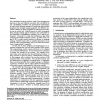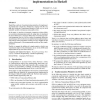120 search results - page 16 / 24 » Polyhedral Analysis for Synchronous Languages |
POPL
2010
ACM
14 years 4 months ago
2010
ACM
Concurrent programming errors arise when threads share data incorrectly. Programmers often avoid these errors by using synchronization to enforce a simple ownership policy: data i...
ASPLOS
1996
ACM
13 years 11 months ago
1996
ACM
On a distributed memory machine, hand-coded message passing leads to the most efficient execution, but it is difficult to use. Parallelizing compilers can approach the performance...
POPL
2009
ACM
14 years 1 months ago
2009
ACM
Haskell has a rich set of synchronization primitives for implemented-state concurrency abstractions, ranging from the very high level (Software Transactional Memory) to the very l...
GPCE
2004
Springer
14 years 3 days ago
2004
Springer
This paper describes Splice, a system for writing aspects that perform static program analyses to direct program modifications. The power of an inter-procedural data-flow analys...
FPCA
1995
13 years 10 months ago
1995
Lenient languages, such as Id90, have been touted as among the best functional languages for massively parallel machines AHN88]. Lenient evaluation combines non-strict semantics w...


